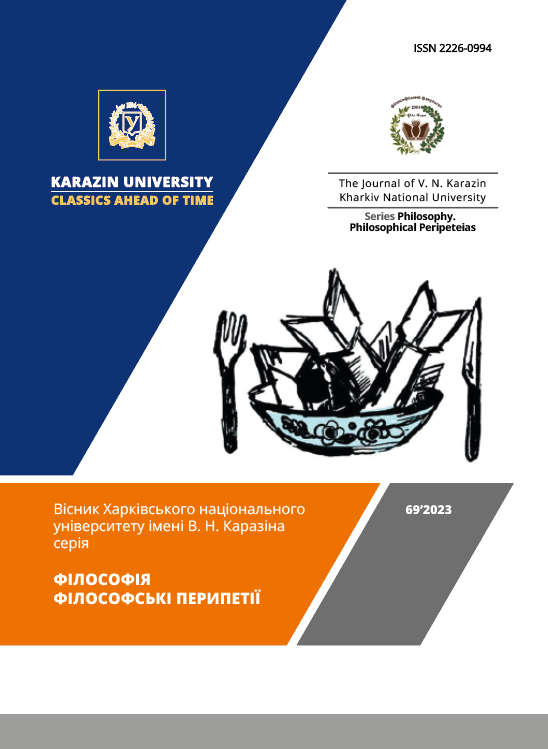NECROPOLITICS OF DEHUMANIZATION
Abstract
The article examines hunger as a tool of political action and necropolitics of dehumanization - reducing a person to bare life, which is a specific phenomenon of modern civilization. Conceptualization of necropolitics is carried out in the context of its understanding proposed by A. Mbembe. A thesis is being developed about supplementing biopolitics with necropolitics, when sovereign power creates zones of death, when it is death that embodies domination and ways of resisting it. Politics is defined as the "work of death" and sovereignty as the "right to kill", which is based on the exceptional state and relations of enmity. Forced collectivization and the artificially created Holodomor are defined as the embodiment of necropolitics, which in general fits into the imperial-colonial discourse, which can be traced in the cultural and economic policy of the Russian Empire, the USSR, and continues with the full-scale invasion of Ukraine in 2022. It is noted that necropolitics can be considered not only in a dialectical connection with biopolitics, but also take the form of nihilistic regression, which is manifested in war, genocide, the destruction of cultural values, etc., of all the values of modern Western civilization that were embodied in the projections of the Enlightenment. It is emphasized that the very limitation of a person in the basic means of life, in food, is aimed at the final dehumanization of a human. The necropolitics of dehumanization consists in reducing a person to his bodily/animal, bare life, that is, existence in the horizon of death. That is why food becomes the most important weapon of the necropower, the result of which is the transformation of a person into a living dead, a zombie, or a cannibal. The phenomenon of imperial politics and totalitarian regimes looks like the perfected logic of necropolitics aimed at destroying human. Hunger is a condition of domination, a compulsion to obey the system. It is concluded that necropolitics dehumanizes not only those whom it turns into the living dead, but also those who rule or identify with the ruling regime, so it is not local, it extends to all of humanity. Holodomor or war cannot be localized, since any detachment from them extends to all the principles/basis of the necropolitics of dehumanization.
Downloads
References
Adams F. (2021). The Right to Food. The Global Campaign to End Hunger and Malnutrition. Palgrave Macmillan.
Badiou A. (2014). The Century / trans. A. Ryepa. Lviv: Calvary; Kyiv: Nika-Center.
Heidegger M. (1976). Brief über den Humanismus. Gesamtausgabe. I. Abteilung. B. 9: Wegmarken (1919-1961). Frankfurt am Main: Vittorio Klostermann Verlag, 313-336.
Hrynevych, L. (2021). Stalin’s Faminogenic Policies in Ukraine: The Imperial Discourse. East/West: Journal of Ukrainian Studies, VIII, 1, 99-143. DOI: https://doi.org/10.21226/ewjus641
Kuba Benedychak (2023). Necropolitics of the Kremlin. ZAXID.NET. 11.01. https://zaxid.net/nekropolitika_kremlya_n1555923
Lacoue-Labarthe Ph. (1988). La Fiction du politique: Heidegger, l'art et la politique. Paris: Bourgois. (In French).
Max Horkheimer/Theodor W. Adorno (2017). Dialektik der Aufklärung / Ed. Gunnar Hindrichs. (Klassiker Auslegen 63). Berlin: Walter de Gruyter.
Mbembe, A. (2003). Necropolitics / transl. L. Meintjes. Public Culture, 15, 1, 11–40.
Mbembe, A. (2019). Necropolitics / transl. Steven Corcoran. Durham, London: Duke University Press.
Professor Lyudmila Hrynevych: Putin, like Stalin during the Holodomor, uses food as a weapon. (2022). / The material by Nazar Oliynyk. Argument. 2022.11.05. https://argumentua.com/stati/profesor-lyudmila-grinevich-put-n-yak-stal-n-p-d-chas-golodomoru-vikoristovu-zhu-yak-zbroyu
Rossi, P. (2018). Eat. Need, desire, obsession / trans. from Italian L. Kotlyar. Lviv: Anetta Antonenko Publishing House, Kyiv: Nika-Center. (In Ukrainian).
Routledge Handbook of Food as a Commons. (2019). Edited by Jose Luis Vivero-Pol, Tomaso Ferrando, Olivier De Schutter and Ugo Mattei. London, New York: Routledge.
Stalin, J. (1951). Works. Volume 13: July 1930 - January 1934. Kyiv.
The coming food catastrophe / Editorial. (2022). The Economist. May. 19. https://www.economist.com/leaders/2022/05/19/the-coming-food-catastrophe
The Routledge Handbook of Dehumanization (2021). Edited by Maria Kronfeldner. London, New York: Routledge.
Zhurzhenko, T. (2015). Commemorating Famine as Genocide: The Conflicting Meanings of Memorials to the Victims of the Holodomor. Modern Ukraine. 26.11.2015. https://uamoderna.com/md/zhurzhenko-holodomor-memorials/
Copyright (c) 2023 Олег Перепелиця, Ольга Храброва

This work is licensed under a Creative Commons Attribution 4.0 International License.
Authors who publish with this journal agree to the following terms:
- Authors retain copyright and grant the journal right of first publication of this work under the terms of a license Creative Commons Attribution License 4.0 International (CC BY 4.0).
- Authors are able to enter into separate, additional contractual arrangements for the non-exclusive distribution of the journal's published version of the work (e.g., post it to an institutional repository or publish it in a book), with an acknowledgement of its initial publication in this journal.
- Authors are permitted and encouraged to post their work online (e.g., in institutional repositories or on their website) prior to and during the submission process, as it can lead to productive exchanges, as well as earlier and greater citation of published work.






3.gif)




